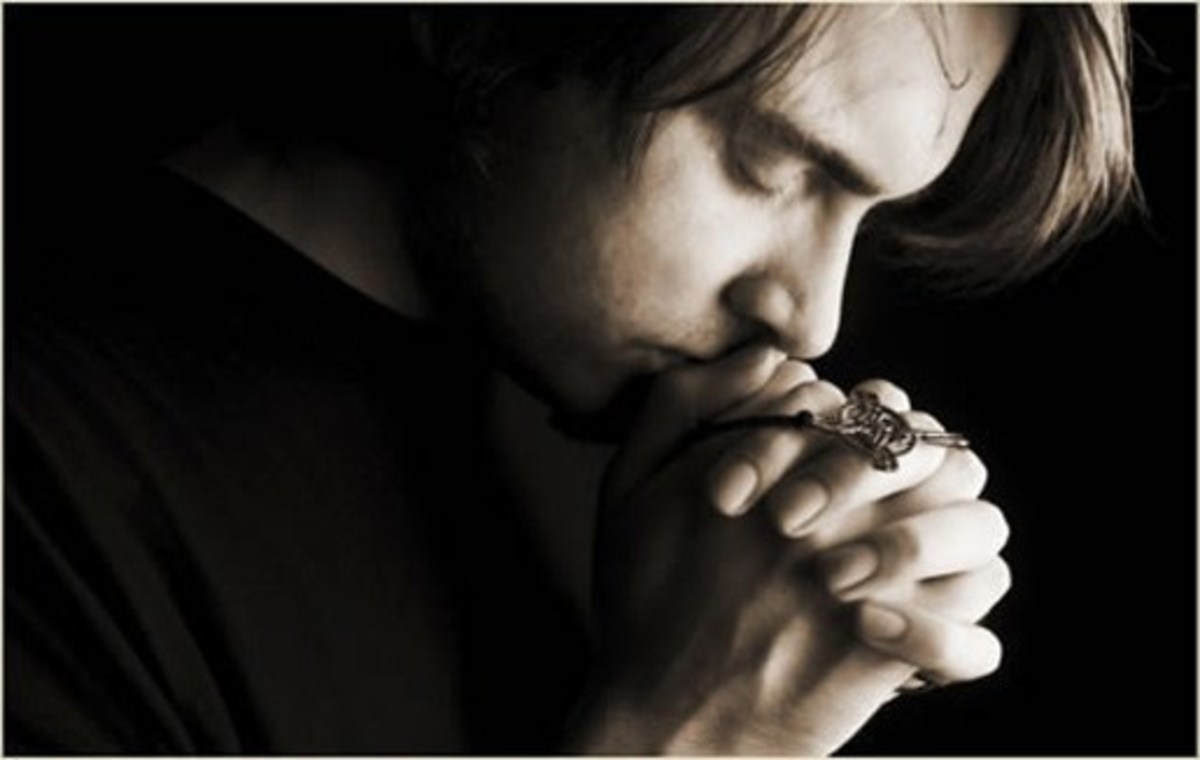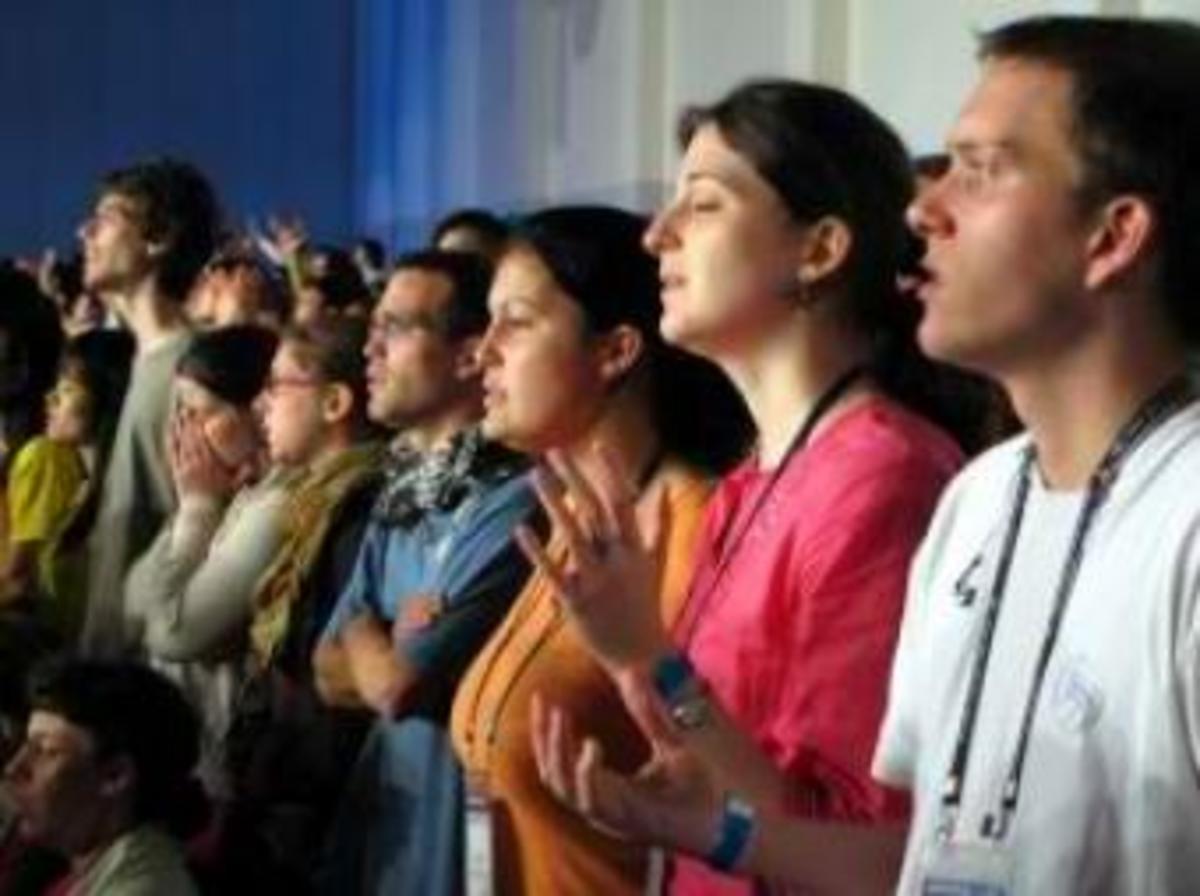Why is it some seek and need religion while others do not?
- MysticMoonlightposted 10 years ago
0
What do you think causes some people to need and seek religion while others are perfectly fine without it? Is it the environment in which they/you were raised? Is it life's trials that makes them/you either turn to religion or away from it? Is it a combination of many different things that causes one to be or become either way? Do you feel you were born to be religious or non-religious and can't think of yourself being any other way? Some people convert, to or fro, religion and if you have, are you more secure/happier now in your current situation? I'd really love to know the whys of any/all of these questions! It's a really interesting topic to me and I'm curious to other people's viewpoints, ideas, and opinions on this topic.
The human brain is complex and as such it is susceptible to the notion of a God. We are only conscious of a small amount of what goes on in our minds so when the super-ego catches wind of a way to control the ego from giving into the ID it latches on and tells the ego what a God is demanding of it.
Very true, Rad Man. I think that it can be very easy for some to fall into Christianity or religion period, as I once was a Christian, I can testify to that, as a way to make sense of things. There is comfort in faith, I will say that. In those days, I had a lot that my mind just didn't understand so I turned outside of myself and to others (church) to find the answers. I wanted something to explain the things that my mind could not and it was very easy to fall into the belief that religion could do that for me. And to be fair, for some people, according to them, it truly does.
I understand that for many, religion is their strength and comfort. I was once that way too so I can respect that and can see why they seek it, need it, and welcome it. I no longer consider myself religious though and since breaking free from all the dogma and all of the "supposed to" restrictions (to me), I can honestly say, I'm happier than I have been in my whole life. I no longer feel a need or desire to turn to others (religious people or the church) for my self fulfillment. It has been very liberating and I now wonder what took me so long to reach this point in my life!
Sorry for the run on post, it may have been TMI, and if so, I apologize!
Last night I was watching a program on television about "secret" societies. One of the speakers offered an explanation for why people gravitate to conspiracy theories. He suggested that such theories offer a simple and safe explanation for the chaos in the world in which we find ourselves.
I suspect the same is true for religion---at least at the level with which most people engage with it. It offers a safe and simple explanation for the world.I saw that same program, mbuggieh, and yes I too think that religion definitely provides some with explanations and, in their view, solutions to the world's questions/issues. I can totally see how religion can be where some choose to turn to find answers and to try to make sense of things. Being part of a mainstream religion at one time, personally, I can testify to this type of thinking process, as I did so myself for years.
Great points you made here and very thought provoking.Really interesting points here... as religion falls away, more people cling to conspiracy theories. It seems there is a psychological need to believe in something bigger than ourselves.
My God, I have written a hub remotely relating to this..............please CHECK it OUT!
Many people need religion to fill a void in their lives. They use religion as an emotional escape mechanism that they can slip into instead of facing and solving their problems. There are others who view religion as a security blanket. They view the outside world as menacing and they see religion as a lure and a buffer against this so-called menacing outside world.
Others need religion because they need an authority figure as they are loath to be co-creators regarding their lives and spirituality. They feel that they are quite insufficient in and of themselves. They have no religious nor spiritual ownership in their respective lives. They give away their power to an authoritative religious figure whom they feel are better able to tell them how to live their lives.
There are still those who are religious out of fear. They were thoroughly inculcated from early childhood that they MUST believe in a religion/God and to be affiliated with a church/religion or they would be considered to be damnable sinners, only worthy of hell. Such people view religion as an afterlife insurance policy, they want to keep their bases covered so to speak.
Conversely, there are people who are highly self-directed who do not need religion. They believe that one can be spiritual and/or believe in God without religion. They see spirituality in all facets of life and that all aspects of life and living are spiritual in nature. They refuse to adhere to the old religious dichotomy of secular/spiritual. To them, ALL is sacred and worthy of respect.
There are those who have progressed and evolved beyond religion. They view religion as an atavistic societal concept. They see God as inclusive in everything. They see God in them and them in God. In fact, they feel that they are God. They know that they are divine beings having a human experience and ACT/THINK accordingly.
And there are those who have religion because they have faith and because their faith is real and authentic.
?? You cannot "have religion" without faith, and lots of it. At best you can pay lip service to believing, but live a lie while you do so.
Not uncommon at all, but certainly not all "religious" people follow that road.Your faith may be real and authentic, but that doesn't mean the thing you have faith in is real and authentic. When I was a child I honestly believed in Santa, turns out there is no Santa.
I will most definitely check out your hub, GM
 You've made so many interesting points here. I can say that I was once one of those that used religion to fill voids in my life, as a security blanket, as a means to explain the things that I could not and in many, many other ways as well. And yes, at that same time I was even religious out of fear. Your response here really hit home for I was once very similar to so many things that you mentioned. Wonder how many there are out there that can relate but will not say so? Interesting, indeed.
You've made so many interesting points here. I can say that I was once one of those that used religion to fill voids in my life, as a security blanket, as a means to explain the things that I could not and in many, many other ways as well. And yes, at that same time I was even religious out of fear. Your response here really hit home for I was once very similar to so many things that you mentioned. Wonder how many there are out there that can relate but will not say so? Interesting, indeed.
What other discipline can you call yourself an "authority," without doing any actual work or needing to learn anything?

Pretty sure that has a lot to do with it.Well when you put it that way, at the moment, I'm drawing blanks, Mark.
 Do you think having a religion is ego related then? I'm not trying to imply this, honestly curious of your opinion. Hope I don't get you in hot water here, I just can't really think of a way to word it more gently right at this moment so nobody get offended please! If so, it is just some religions you feel are ego related or all of them?
Do you think having a religion is ego related then? I'm not trying to imply this, honestly curious of your opinion. Hope I don't get you in hot water here, I just can't really think of a way to word it more gently right at this moment so nobody get offended please! If so, it is just some religions you feel are ego related or all of them?It depends on the person. Take Ray Comfort or Kent Hovind as an example - they are self professed "authorities," yet - what credentials do they have? What did they need to learn? How are they tested and measured? None of these apply. Compared to becoming an "authority," biologist, astrologist, whatever - all they did was say the majik words.
How many politicians do you know who claim a "strong faith in god," as the basis for their qualifications to run for office?
They get an ego stroking comfort that is different to the person who gets the internal comfort that repetitive rituals give. And I think this applies to all the political religions such as Christianity and Islam.Ah yes, I definitely see what you're saying. Perhaps some that claim "authority" in religion feel they can do so because they are comparing themselves against their own colleagues, as in who's more successful with their accomplishments and endeavors in their area of "expertise". Ray Comfort for example designs tracts, writes books, and made some documentaries and such, among other things. To him and anyone else that may do similar works, their level of involvement and achievements in their "areas" may give them the confidence to make such claims. Definitely doesn't mean that they should especially when, as you stated, comparing them with or against the credentials of other authorities in other fields, there is no comparison in that regard that I can see. Such ways can definitely seem to go hand in hand with the ego without a doubt.
In all humans I think the capacity to form god-belief is based on the following:
1 Pattern recognition
2 Capacity to believe in a positive outcome despite negative material conditions (hope)
3 Ability to form images not perceived through the senses (imagination)
4 The biological imperative to form co-operative social groups (religion)
5 The biological imperative to compete with other groups (religions)
I think what differs is the degree to which individuals are influenced by them. For example, if you live in material conditions that are dire, and are suffering every day with no realistic prospect of escape, then hope potentially becomes a survival mechanism. It's something that keeps you (and the genes you carry) going. So living in material conditions can bring about a tendency to hope, and that mental state is conducive to religious belief.
The desire for acceptance is an aspect of 4 and 5 above. We want to be accepted into social groups because that increases our likelihood of survival. We don't want to be "other" as that reduces the likelihood of our survival. In some cases religious belief is the price of gaining acceptance into a social group. These groups include those connected by genetic similarity (families), those connected by local proximity (communities) and those connected by wider geographic location (countries). Someone born into a religious family, within a religious society is therefore more likely to have religious belief than someone born into a non-religious family within a secular society.You make some really great points here, Don W. I would definitely agree that certainly, for many people, struggles early on in life especially, do trigger hope and a strong desire for things to get better so much so that it probably often does lead people to seek religion in many instances. Even seeming to need it. I've heard people make such statements. That would certainly make sense for those that say that finding religion saved them, in more ways than one. It is what gets/got them through things, or even helps them heal old wounds, find inspiration, determination, etc.
Also, I too think that being born into a religion, or being exposed to a religion by family and/or community early on certainly would influence and sway many, or it so may seem. We, as a society, often love to "fit in" and "mesh" with our peers and those that we respect, admire, and look up to without a doubt and more often than not. People falling in with their families and communities, religiously speaking, is almost a given it would seem. At least for some time or for a decent amount of time in their lives.
Hi Mystic (waving). This is a very thought-provoking question I have wondered about myself.
I know for me, my religion is a means of spiritual expression. Just like my keyboard and the rules of grammar are a means of me expressing myself as a writer, my religious practices are a means of expressing myself as a spiritual person. Some people don't feel the need to write; they prefer to express themselves in other ways. Just as some people feel no need for a religion, and some do.
Also, I'm a firm believer in the psychological and sociological benefits of things like ritual, tradition, rites of passage, etc.-- for me religion provides the framework for these things.
I don't think it was how I was raised-- my parents were non-practicing Catholics. It was me who began sneaking off to church as soon as I was allowed to cross the street, who would say my rosary, and began studying the Bible (and eventually, other religions). I definitely have felt more satisfied since finding Wicca than ever before, and that's certainly not something I had any exposure to until I was in my 20s.
While I find my religion very fulfilling, it's certainly not the only fulfilling part of my life. I don't think fulfillment in one area necessarily negates fulfillment in any other areas. I can go both inside and outside of myself for answers. I don't see being religious as restricting me from doing that. I don't think it needs to be either/or. I guess I see a difference between religion and dogma. I can see how religions that are very dogmatic can make people unhappy if they don't find any personal satisfaction in the dogma and are just going through the motions because they are told to do so, but I don't think the baby needs to be thrown out with the bath water. While it's certainly fine to abandon religion, it's not the only option if a person is unsatisfied with their previous one.
I don't know if I was "born" to be religious. I just know that religious practices have always been very moving and meaningful to me, and I've always felt drawn to them. when I spent a few years seeking, I felt adrift without an anchor with no specific religion. Like many things in my life-- my children, my husband, my hobbies, etc.-- it's something I could probably live without if I had to but not something I'd want to live without.
Interesting topic, sorry for rambling a bit but you inspired many thoughts.
Blessings to you~Hello, WiccanSage (waving back)
 Thank you so much for sharing these wonderful thoughts and feelings. This is a topic that often crosses my mind and thoughts and I've been so curious as to how others view and feel about it so I really appreciate you sharing this!
Thank you so much for sharing these wonderful thoughts and feelings. This is a topic that often crosses my mind and thoughts and I've been so curious as to how others view and feel about it so I really appreciate you sharing this!
The feelings that you express about your religion are so heartfelt and beautiful. Your passion for it really comes through and I can truly feel the joy that it brings to you...so lovely. I really like how you explained that your spirituality is how you express yourself, such a true statement! Religion can be such a beautiful, rewarding and joyful part of life.
I so agree with religion not having to be dogmatic. I think that dogma can be really detrimental. Personally, I was immersed in Christianity for so long that for me, dogma and religion went hand in hand. It took its toll on me. I was living a life that others wanted me to have, I did things because I was "supposed" to, I was definitely going through the motions for years. I admit, it has left me somewhat bitter but I'm trying to work through all of that. I left Christianity because I felt that I could no longer "act" and to be honest, I just didn't want to live my life "acting" for another day, month, or year. It was not where I belong and I've slowly had to reevaluate, take a step back, and find myself. It's a journey and not always easy but I have to say that since letting go of all the things I was told I should do and believe and informing and searching for myself, I am so much happier. At this time, I simply take time to connect with nature and all that it has to share with me. It is fulfilling and brings me such peace, happiness, and joy. Something that I haven't had in years and it is wonderful.
I'm so glad that you found this topic interesting and thought inspiring. Your story and thoughts have given me so much to think about as well, thank you so much. Many blessings to you
Thank you Mystic, for your kind words. I am so glad that you've found your way to a path that makes more sense and is more fulfilling to you. When it comes down to it what we label ourselves is irrelevant, it's being true to ourselves and what we believe that counts and fosters true spirituality (with or without religion). I'm busy reading some of the other interesting answers here now, again great question.
It's because humans are prone to superstition, which is one of many unfortunate side effects of our advanced intelligence. And some are more prone than others.
Very interesting points, Zelkiiro. Superstition being a key component of why some may seek religion makes a lot of sense and is an aspect that I've not really considered before. This gives me much to think about. Thank you

Some religions are not superstitious, though. For example, Unitarian Universalism is based on 7 sound principles that do not conflict with anything in science or nature, and provides community for people of varying beliefs-- many UUs are atheists, yet they are still drawn to the somewhat structure of a religion/church community. This is something that equally interests me-- that not all theists are religious, yet not all religious are theists anymore.
It all comes down to the brain. Studies are showing more and more that believers let off the feel good dopamine when praying. If something feels good, you're likely to keep doing it.
I found this article interesting https://www.scientificamerican.com/arti … -the-brain
Other articles state that different parts of the brain seem to light up more for non believer and others think it is a chemical imbalance that causes the need for religion. They believe this imbalance is similar to the imbalance in people who "attention seek". It all works the same part of the brain.Wow, very very interesting, peeples. Religion and a dopamine effect, that would certainly hint as to why some seem to become dependent on prayer I'd think.
Can it be imbalanced if has been the norm for the majority of people throughout history, spanning across various cultures and eras? Perhaps it's being a non-believer that's more of an imbalanced that has evolved. One has to wonder.
I'm sorry, you realize that mental disorders (imbalances) are the norm right? I mean, it's estimated that half the world's population has an imbalance. It isn't an insult. Those believers get a high level of dopamine which is actually a healthy thing even if it is an imbalance.
Could it be that somehow you took my post as an insult to your belief?
- Emile Rposted 10 years ago
0
I remember when the Berlin wall fell. I commented to a friend that I would give anything to sit in a cafe in Russia and talk to the common man. To hear words many thought they would never feel safe enough to speak. My friend shrugged and said 'who cares? What does it matter to us?' How far out our mind wanders from the immediate vicinity of our lives determines how far we are willing to search for answers. It determines the complexity of the questions we ask.
People seek religion for the same reasons others follow cosmology. Some are most fascinated with string theory or theoretical physics. We (most of us) have an insatiable curiosity about the world we inhabit. Where did what we see originate? How did the complexity of life come to be? Why do we appear to be the only ones asking these questions? Until one of the avenues we have for hoping to find the answers has a major breakthrough which definitively answers these questions religion will maintain a seat at the table.So very true, Emile. The more the mind seeks, searches, and questions the more compassionate we may become. We start to see endless possibilities within that search, new doors open, we discover aspects of ourselves and even of others that were once out of our line of vision. Very inspiring and exciting.
I think that religion will always be prominent. It is a cornerstone for so many. A foundation even. But I think that Agnosticism, Atheism, and even non-dogmatic/orthodox beliefs and/or spiritualities are on the rise. I think that more people are asking questions, and not only that, the questions they are asking are great questions. Many are seeking and searching for themselves more commonly now. Now, if we (society) can learn to "just get along" oh how interesting and exciting life may become!
Related Discussions
- 110
Where did people get the idea that religious people are judgements?
by Jack Lee 6 years ago
In discussion here on hubpages, we hear some accuses religion people of being judgemental and more over accuses religious people of forcing their believes and policies on the American people through laws...That is not the religion or people I know. Where is this disconnect coming from?Could it be...
- 69
If you were in charge of Hub pages what would you change?
by Mamelody 14 years ago
I would wipe off especially the religion topic as I hate religion big time and wish it never existed.I would abolish the 3day ban rule and opt for just deleting personal attack comments.I would chose to pay members who are active participants in the forum.I would give a bonus $1,000 prize to the...
- 593
Where does someone like me, with psychic ability, fit into Christianity? Do you
by Dr. Marie 6 years ago
Where does someone like me, with psychic ability, fit into Christianity? Do you think I am evil?I believe in God & Jesus & God's Holy Spirit. But I was born psychic. I see dead people and I talk to dead people. It is a God-given ability. I help people. Yet I cannot label myself as...
- 634
If you don't believe in God, why does it matter to you if others do?
by Jenna Ditsch 3 years ago
I am sincerely curious as to why those who do not believe in the existence of God would spend time and energy to convince others to believe the same? I am asking this respectfully and am seeking true, valid answers--not attacks or arguments. I just want to understand the...
- 397
What actually inspires a person to be Atheist?
by muhammad abdullah javed 5 years ago
What actually inspires a person to be Atheist?
- 54
Why do you feel that your religion has lost touch with many?
by Liam Hallam 12 years ago
Why do you feel that many people have deserted a particular religion or simply chosen not to followHave the major religions not moved with the times? As an agostic i'd like to see what others feel and see?













